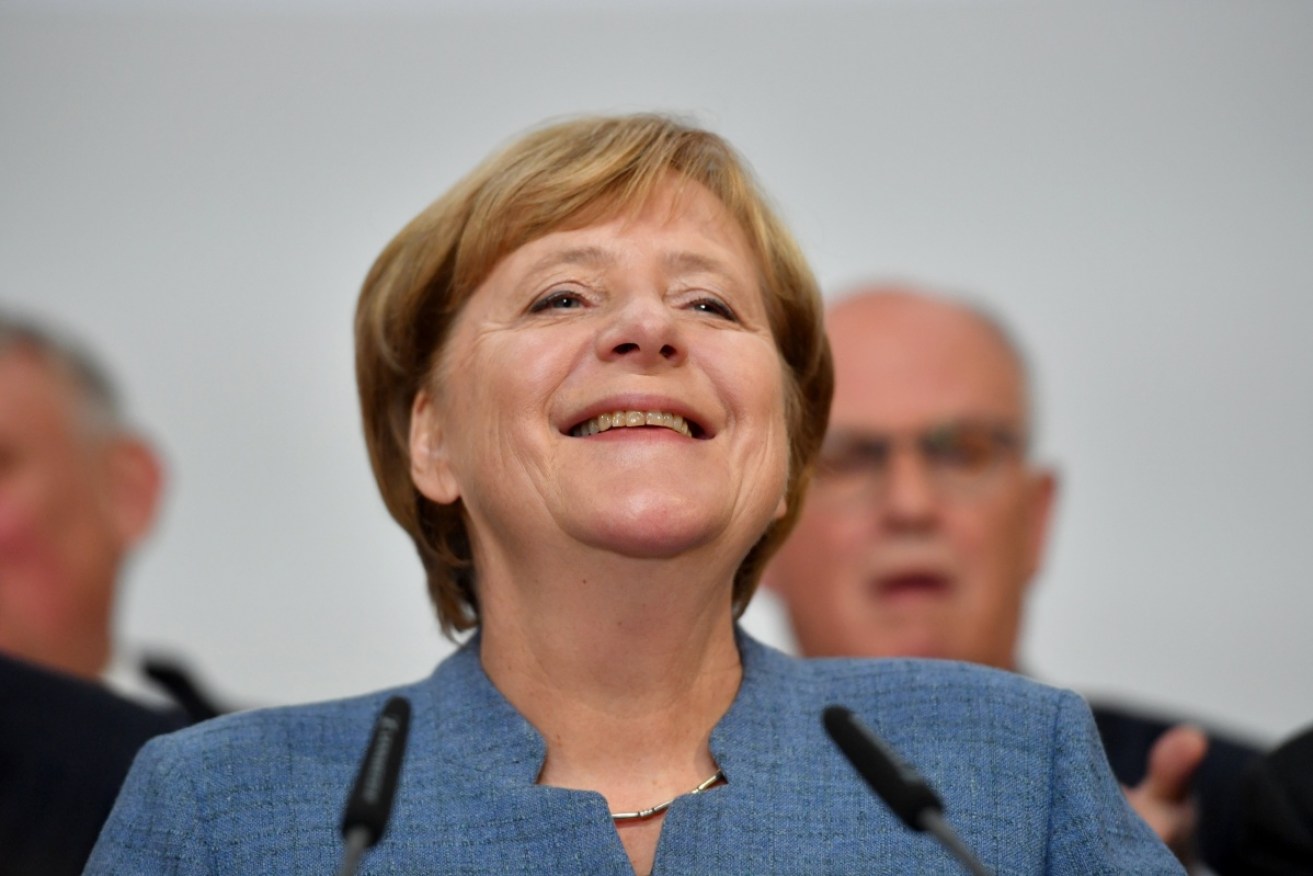Far-right marches in to German parliament, Angela Merkel holds on

Chaos and instability as predicted when Angela Merkel steps down after leading Germany since 2005. Photo: AAP
German Chancellor Angela Merkel has won a record-equalling fourth term in office, after elections that have seen a far-right party win seats in Germany’s parliament for the first time in more than half a century.
But Ms Merkel will have to form an uneasy coalition to form government, after her conservatives haemorrhaged support to the far-right Alternative for Germany (AfD) party.
After shock election results last year, from Britain’s vote to leave the European Union to the election of US President Donald Trump, many look to Ms Merkel to rally a bruised liberal Western order, tasking her with leading a post-Brexit Europe.
She must now form a coalition government – an arduous process that could take months, as all potential partners are unsure whether they really want to share power with her.
Ms Merkel’s conservative bloc won 33.5 per cent of the vote, making them the largest parliamentary group, an exit poll for broadcaster ZDF showed – a sharp drop from its 41.5 per cent in the last election, in 2013.
Support for their closest rivals, the centre-left Social Democrats (SPD) which are currently junior partners in a so-called “grand coalition” with Ms Merkel, slumped to 20 per cent – a new post-war low.
But the biggest shock came in the form of the AfD which stunned the nation by finishing third and entering parliament for the first time, with 13.2 per cent of the vote.
The result sparked protests around the country, while Germany’s Die Welt newspaper described the result as “the triumph of the fear campaign,” referring to the rise of the far-right and anti-immigration AfD.

The strong showing of the AfD sparked protests, here in Berlin. Photo: AAP
Ms Merkel, Europe’s longest serving leader, joins the late Helmut Kohl, her mentor who was leader during Germany’s reunification, and Konrad Adenauer, who led Germany’s rebirth after World War II, as the only post-war chancellors to win four national elections.
SPD deputy leader Manuela Schwesig ruled out a repeat of Ms Merkel’s existing alliance with the party.
An alternative coalition would be a three-way tie-up with the liberal Free Democrats (FDP) and the Greens. That is a combination as yet untested at national level and known as the “Jamaica” option because the three parties’ colours are those of the black-gold-green Jamaican national flag.
Both parties have played down that prospect but, as they have been out of government for four and 12 years respectively, they may be lured into an alliance by the prospect of power.
AfD success ‘particularly depressing’
The AfD is projected to take as many as 98 seats in parliament after winning 13.2 per cent of the vote.
The AfD was founded in 2013 as a eurosceptic outfit, but has turned its focus to opposition to immigration and Islam amid a nationalist backlash against Chancellor Angela Merkel’s decision to welcome hundreds of thousands of migrants in 2015 and 2016.
Its 13.2 per cent share of the vote makes the third-biggest party in parliament, giving it more support than that earned by parties pushing pro-business, environmentalist or hard-left positions.
An exit poll conducted by the research institute Infratest dimap on Sunday showed that 46 per cent of German voters are “very worried about the rising influence of Islam” in the country and 38 per cent said there are too many foreigners entering the country.
Ms Merkel said she would seek “to win back voters by listening to their concerns and their fears and primarily by conducting good politics.”
Mr Schulz later blamed Merkel for the far-right surge, saying that she had run a “scandalous election campaign” devoid of meaningful debate and that the AfD had filled the vacuum.
AfD lead candidate Alexander Gauland, 76, said: “We’ve made it – we will change this country.”
“The fact that we are the third-strongest party (means that) this government should dress warmly. We will chase them! We will chase Merkel or whomever else! And we will take our country and our nation back,” he said.








